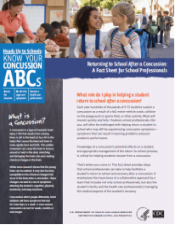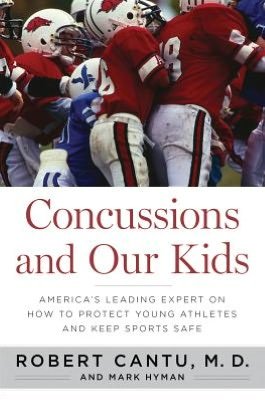Female Athletes Show No Difference from Males in Neurocognitive Testing After Suffering Sports-Related Concussions
- Created on Wednesday, 07 November 2012 15:10
- Last Updated on 21.02.2013
- Published Date
As female participation in sports grows rapidly, there is a popular notion that there are gender-related differences in athletes' responses to sports-related concussion, and prior research has supported these gender discrepancies.

"There has been good data that suggests girls score worse on neurocognitive testing following a sports-related concussion. Our hypothesis was that a tightly-controlled study would replicate what others have shown previously," said Scott Zuckerman, M.D., a neurosurgery resident who conducted the study with colleagues at the Vanderbilt Sports Concussion Center.
The researchers selected 40 male and 40 female concussed patients who were matched, as closely as possible, for age, medical/psychiatric history, years of education, lack of special education assistance, history of psychiatric treatment, number of prior concussions, timing of pre- and post-concussion testing, and sport (all engaged in soccer).
This is the first study to control for type of sport played when looking a gender differences, Zuckerman said.
"Prior studies have used mixed groups of athletes from a variety of sports. We suspected that since concussions vary from sport to sport (i.e., helmets vs. none, varying biomechanical forces, etc.), if the variable of sport was controlled, gender differences might disappear."
The only significant gender-related difference they could identify was that female soccer players reported a greater number of symptoms post-concussion. There were no significant differences in post-concussion neurocognitive scores.
"We were somewhat surprised and were not sure what to expect in such a tightly controlled population," Zuckerman said. "Our hypothesis was that females would experience greater levels of acute, post-concussive, neurocognitive impairment than males, fitting with what most of the prior literature says, but we found virtually no difference between males and females."
Zuckerman said this is a significant finding for the treatment of sports-related concussion.
"When we see any child after concussion, we don't want to make snap decisions based on gender. Gender may not be as big a modifying factor as previously thought."
This study is the first from V-SCoRe, or Vanderbilt Sports Concussion Research. Collaborators include Allen Sills, M.D., Gary Solomon, Ph.D., Andrew Gregory, M.D., Alex Diamond, D.O., and Jonathan Forbes, M.D., and medical students Mitchell Odom and Young Lee.
"This effort is just getting off the ground, and we're investigating many more modifying factors in concussion, including age, sleep, symptoms, prior history of attention deficit disorder," Zuckerman said.
"Our goal is to create new knowledge in thihttps://and help providers better understand when a young athlete can return to play safely."
https://https://Story Source:
https://The above story is reprinted from materials provided by Vanderbilt University Medical Center, via Newswise.
Journal Reference:
- Scott Zuckerman et al. Response to acute concussive injury in soccer players: is gender a modifying factor? Clinical article. Journal of Neurosurgery: Pediatrics, 2012 DOI: 10.3071/2012.8.PEDS1239
Brain Health
It is rare for a sports-related concussions to result in a more serious injury such as a skull fracture or hematoma. Nonetheless, it pays to be aware that catastrpohic injuries do sometimes occur as ...
read more...-
CT scans may increase brain cancer risk
Children and young adults scanned multiple times by computed tomography (CT), a commonly used dia...
-
Sub-concussive impacts may affect learning
MINNEAPOLIS – A new study suggests that head impacts experienced during contact sports such as ...
-
Physical activity boosts learning
INDIANAPOLIS – School administrators looking to restructure the academic schedule should consid...




Neuroscience
Athens, Ga.- University of Georgia researchers have developed a map of the human brain that shows great promise as a new guide to the inner workings of the body's most complex and critical organ.
...
read more...-
Does CTE infect neuron to neuron?
NFL Hall of Famer "Iron Mike" Webster's life ended in 2002 when he suffered a heart attack at age...
-
Progesterone seems to protect neurons after injury
It is not yet known why girls suffer concussions at a higher rate than boys. The most prevalent...
-
Amino acids may restore concussion's chemical imbalance
Concussions are often called the "invisible" injury because they are usually not detectable by t...
Resources
- School professionals play an important role in the health of all students. Recognizing the signs and symptoms of concussion is important, as is managing their return to school ...
- https://
- CDC's Concussion Training for Clinicians
-
Concussion Education Video Programs - Free and Easy
Parents, athletes, coaches and medical professionals have access to concussion education created...
-
New concussion guidelines for team physicians
INDIANAPOLIS – Team physicians who assess and treat athletes suspected of concussion have new ...
quick links
Latest News
Concussions Occur...
...in Any Sport
REMOVE athlete from play
REFER to medical provider
REST no sports, no texting/TV
RETURN only with doctor's OK
Source: Children's Hospital Boston, Sports Concussion Clinic


































